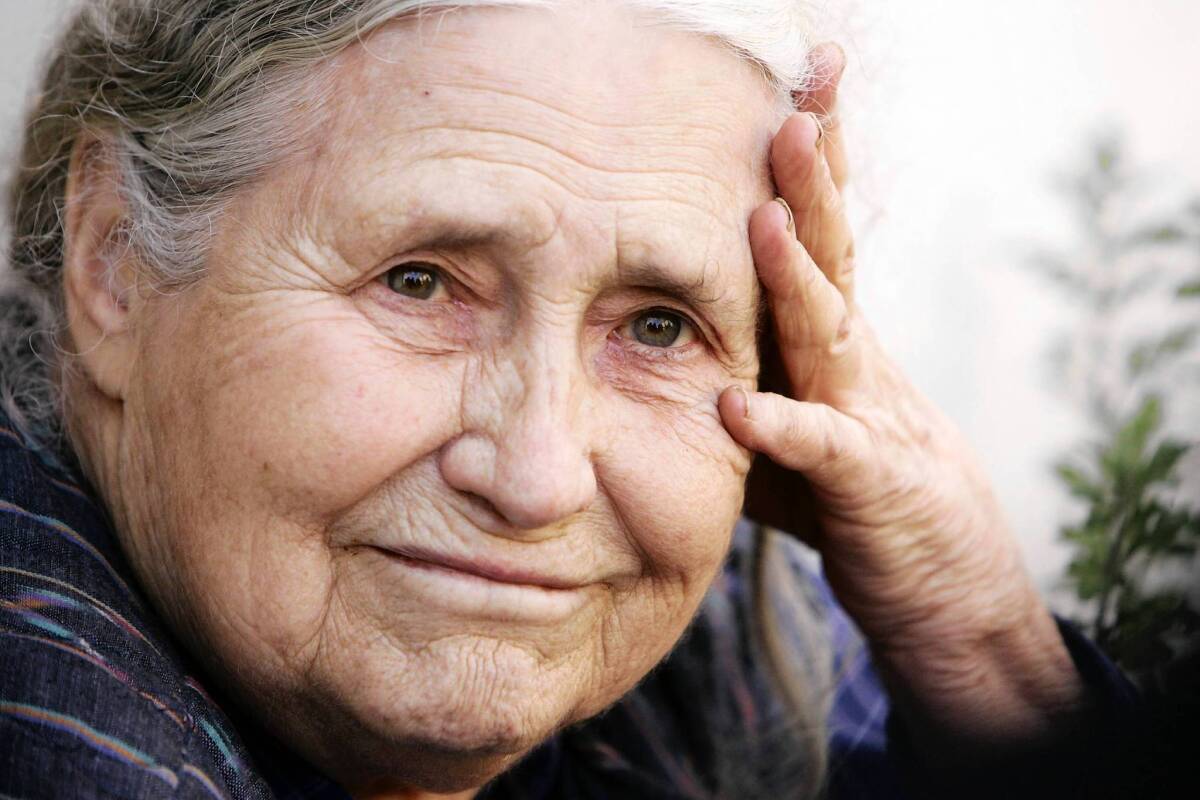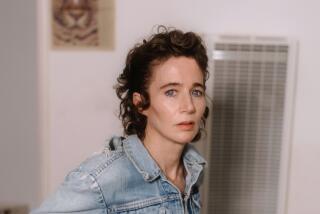From the Archives: Doris Lessing dies at 94; British novelist of the âfemale experienceâ

When Doris Lessing learned she had been chosen as the 2007 Nobel laureate in literature, her response was something less than joyous.
âI canât say Iâm overwhelmed with surprise,â she told reporters outside her London home as she emerged from a cab with a bag full of groceries. âIâm 88 years old and they canât give the Nobel to someone whoâs deadâŚâ
Famously outspoken, the diminutive grande dame of English literature was too old not to scoff at the honor â âa bloody disaster,â she called it later, which left her no time to write.
Lessing, whose richly imagined, scathingly perceptive novels helped define early feminism and the doomed idealism of the postwar generation, died Sunday in London. She was 94.
Her publisher, HarperCollins, announced her death, saying it was peaceful.
A school dropout at the age of 14, Lessing was known for her wide-ranging and impatient intellect, honed by her own keen curiosity, her grounding in two continents â southern Africa, where she grew up, and Britain, where she spent most of her adult life â and her insatiable appetite for books, including Russian novels, Moorish history, science fiction and Sufi mysticism.
She wrote more than 50 books of extraordinary range, exploring the social and political conflicts of her day, the colonial experience in Africa, the possibilities of extraterrestrial life â and most memorably, the conflicted recesses of the female heart.
The Nobel committee called her an âepicist of the female experience, who with skepticism, fire and visionary power has subjected a divided civilization to scrutiny.â The divides Lessing plumbed were black and white, male and female, terrorist and socialite, even human and alien.
Her novels, short fiction, essays and memoirs explored her native Rhodesia â beginning with the 1950 chronicle of racial injustice and murder, âThe Grass is Singingâ â and her own early years as an idealistic, and eventually disillusioned, communist. Lessing more than once attempted to tackle the horrors of World War I and the devastating imprint it left on her family, and much later, she confounded her usual readers with a series of science-fiction novels, âCanopus in Argos,â reflecting her newfound conviction that space had become the new mythic terrain of human conflict.
But she is best known for âThe Golden Notebook,â which in 1962 was an early and for many female readers life-changing chronicle of the multiple and maddeningly contradictory roles women must play in a world that usually defined the roles of marriage and children for them.
In her work, Lessing raised but didnât necessarily answer the existential questions of womenâs lives in the 1960s and beyond: Is it better to be married or single? How do you raise children and have a professional life? Is a woman denying her intellect if she longs for a man to love her? Why do older women still feel passion, and what is acceptable for them to do about it? If my life is so perfect, why do I feel as though Iâm losing my mind?
Lessingâs own early years were a study in feminine turmoil: She spent most of her life in bitter recriminations against her mother, whom she accused of taking out the frustrations of her unsatisfying life on her children; Lessing then proceeded to leave behind her first two husbands and two of her three children in Africa when she bolted to England.
âThe Golden Notebookâ suggested that humanity, male and female, is driven by a common yearning: âEverybody in the world is thinking: I wish there was just one other person I could really talk to, who would really understand me, whoâd be kind to me,â one of the characters said. âThatâs what people really want, if theyâre telling the truth.â
Lessing resisted being called a feminist, in fact frankly condemned the man-hating excesses of the early womenâs movement.
âI think they missed a great many opportunities,â she said in a 2007 interview with The Times. âJust to oversimplify, they went political. From the moment they went political, inevitably they were going to fragment and bitch-bite and call each other names. They did some unspeakably bad things, like rubbish women who were bringing up children,â she said.
âIf I say the 1960s motto was âwomen good, men bad,â I think Iâve summed it up,â she said. âBut things have changed. I think I have noticed that what young women are doing is looking for a husband, just as if there hadnât been any so-called feminist revolution.... Not saying they want to get married, necessarily. I also know a lot of women who donât want children, which I think is marvelous. What a liberation that is, in that nobody even blames them for it!â
Lessing was born Doris May Taylor on Oct. 22, 1919, in Persia (now Iran), where her father, who had lost a leg during World War I, was working as a bank clerk and her mother as a nurse.
Loading up her motherâs fine carpets and Persian collectibles, the family moved in 1925 to try to make their fortune in what was then Rhodesia, now Zimbabwe. Lessing described a childhood marked by the freedom and solitude of roaming the veldt and the contradictions in culture that came with growing up British in Africa: her mother playing Chopin on the piano while the low throb of African drums beat in the distance outside the window.
Lessingâs own writing about her childhood, especially the first volume of her autobiography, âUnder My Skin,â published in 1994, talks about living amid the racial divisions of colonial southern Africa. (Her outspokenness about racial injustice prompted the governments of Southern Rhodesia and South Africa in 1956 to declare her a âprohibited alien.â) And it painfully recalls the misery of growing up with a father haunted by war and a mother who plainly expected more from her life, and her daughter, than she ever got.
âWomen of my motherâs generation should have had jobs, but they didnât. My mother was extraordinarily talented. They took it out on their children, they lived for their children, so we all had mothers who made our lives an absolute misery,â Lessing said in the 2007 interview.
Eager to leave home, Lessing got a job as a telephone operator in Salisbury in 1937 and married Frank Wisdom at the age of 19, quickly having two children. Like many in that era, she was drawn to the promise and ideals of communism, and was also clearly fearful of turning into a Rhodesian housewife like her mother. Lessing left Wisdom and married one of the central figures in the local leftist group, Gottfried Lessing, with whom she had another son, Peter.
Soon she left that husband too and took Peter with her to London, where the publication of âThe Grass Is Singingâ quickly began to establish her reputation as a writer.
âThe Golden Notebookâ was a heavily autobiographical attempt to weave together the many threads that already were running through Lessingâs life, and competing to define who she was: The main character is a writer and single mother who also chronicles her experiences in Africa and as a member of the British Communist Party.
Later in life, Lessing balked at doing many interviews â she got bored with the same questions â but obligingly appeared at literary festivals and British university classes.
âSheâs been one of the most generous, open-minded teachers weâve ever experienced here,â said David Morley, director of the creative writing program at the University of Warwick. âAnd sheâs never received a fee. Sheâs done it simply out of her belief in the value of teaching.â
In her Nobel acceptance speech â delivered by her publisher, because she was too unwell to make the journey to Stockholm â Lessing decried the disappearance of reading as a foundation of the culture and wondered what would happen because of it.
âWe are in a fragmenting culture, where our certainties of even a few decades ago are questioned and where it is common for young men and women who have had years of education to know nothing about the world, to have read nothing,â she said.
âHow are we, our minds, going to change with the new Internet, which has seduced a whole generation into its inanities, so that even quite reasonable people will confess that once they are hooked, it is hard to cut free, and they may find a whole day has passed in blogging?â
Even in Rhodesia, Lessing had said, she grew up reading Dostoevski, Chekhov, Turgenev, Dickens, Kipling and Sir Walter Scott.
âWriters do not come out of houses without books,â warned Lessing, the oldest-ever Nobel laureate for literature.
Lessingâs main battle in recent years seemed to have been against her own growing frailty. She continued to publish â âThe Cleft,â a novel about what happens when a primitive race of vaguely aquatic females suddenly starts giving birth to boys, came out in 2007. And in 2008, she finished a rethinking of her parentsâ lives, âAlfred and Emily,â imagining what might have happened to them had their lives not been ruined by war. But Lessing complained that she was finally running out of steam. She announced that âAlfred and Emilyâ would be her last book.
âOf course we donât change character at all,â Lessing said of growing old. âBut our capabilities â I can tell you that losing energy is the worst thing there is, and thatâs what happens when youâre aging.... And thatâs why I tell everybody, for Godâs sake, make use of your energy while you have it. Because itâs going to go down a black hole.â
She is survived by her daughter Jean and two granddaughters.
Times staff writer Steve Chawkins contributed to this report.
More to Read
Start your day right
Sign up for Essential California for the L.A. Times biggest news, features and recommendations in your inbox six days a week.
You may occasionally receive promotional content from the Los Angeles Times.






